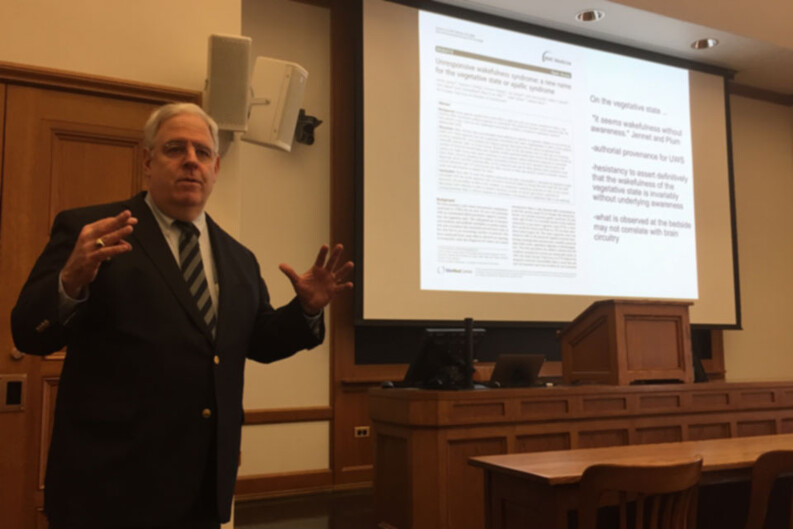Dr. Joseph Fins Speaks on Disorders of Consciousness and Civil Rights

On October 15, 2019, the Solomon Center for Health Law and Policy4 and the Yale Health Law and Policy Society5 hosted “Rights Come to Mind: Brain Injury, Neuroethics and Disability Law,” a lecture by Joseph Fins, M.D. Fins is the E. William Davis, Jr. M.D. Professor of Medical Ethics and Chief of the Division of Medical Ethics at Weill Cornell Medical College, where he is also a Tenured Professor of Medicine and codirector of the Consortium for the Advanced Study of Brain Injury (CASBI). At Yale Law School he is the Solomon Center Distinguished Scholar in Medicine, Bioethics, and the Law.
In his lecture, Fins outlined the foundation for a civil rights argument pertaining to individuals in a “minimally conscious state.” He first delved into the evolution of the scientific community’s understanding of disorders of consciousness, including the identification of a “minimally conscious state” from which brain injury patients can emerge and the 2018 reclassification of the “permanent vegetative state” as a “chronic vegetative state.” Against the backdrop of “right to die” cases like those of Nancy Cruzan, Karen Ann Quinlan, and Terri Schiavo, in which decisions relied largely on the perceived permanency of the patients’ vegetative states, these developments are unsettling: upwards of twenty percent of patients thought to be permanently vegetative might actually recover consciousness, and patients who appear to be vegetative might truly experience consciousness. Fins argued that these recognitions require an adjustment in how these minimally conscious individuals are treated under a civil rights schema.
Fins illustrated what a system that recognizes minimally conscious patients’ potential for rehabilitation might look like through a handful of patients’ stories. Repeated visits and neuroimaging could help physicians identify who is in a minimally conscious state rather than a chronic vegetative state. Based on the axonal sprouting and pruning seen in patients with severe brain injuries, Fins suggested that neural rehabilitation could be better approached like reeducation. Tools like thalamic deep brain stimulation could support recovery, restoring communication, and in some cases, a patient’s functional independence.
Fins argued that the legal obligation for providing diagnostic and rehabilitative tools would be rooted in Olmstead v. L.C., a 1999 landmark case that prohibits unjustified segregation based on disability. Providing minimally conscious patients with the ability to communicate, and thereby providing a window into their consciousness, could provide these patients a path to obtain the type of community integration enjoyed by other citizens and to avoid being subjected to the painful confounding conditions that result from negligence.
Fins leads the Solomon Center’s Brain Injury Project6, a collaboration with his Center for the Advanced Study of Brain Injury (CASBI) at Weill Cornell. The project brings together an interdisciplinary team of Yale graduate students to collectively produce innovative scholarship to advance the rights of severe-brain-injury patients and promote their integration into society. Since it was founded five years ago, the project has produced more than ten published articles for which Law School students and recent graduates were coauthors.

